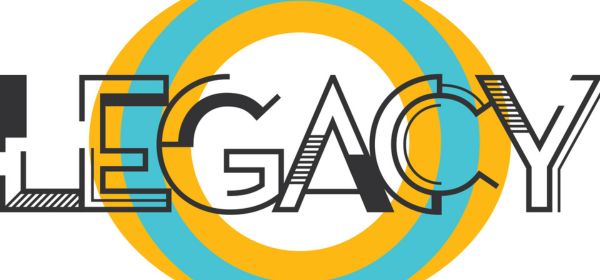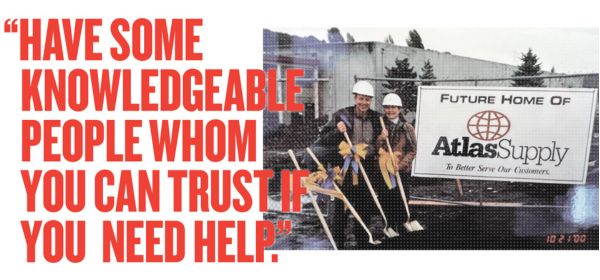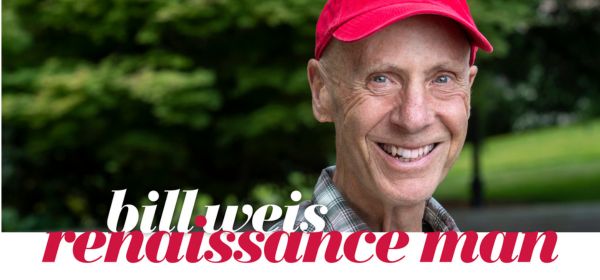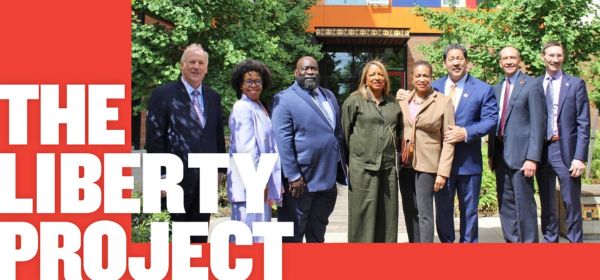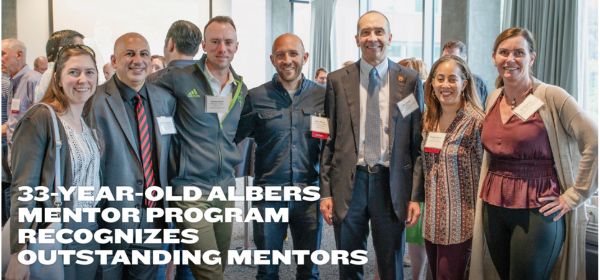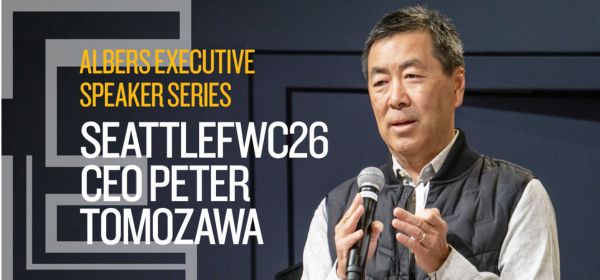
When asked what the impetus was in starting the business plan competition that bears her name, Professor Emerita Harriet Stephenson said, “Building credibility. We wanted to be part of the leadership pack in developing entrepreneurship programs on the West Coast.”
That was in 1998. Twenty-five years later, the Harriet Stephenson Business Plan Competition, organized annually by the Innovation & Entrepreneurship Center (IEC), has become the testing ground for a wide range of Seattle University business ideas, from automated sunscreen dispensers to a nonprofit school for children with autism. It has given away over $400,000 in prize money and started numerous former contestants on their first entrepreneurial journeys.
Some of these ideas have gone on to become huge successes in the marketplace. 2018 winner Vita Inclinata Technologies, creator of the world’s first autonomous system that stabilizes loads under helicopters and cranes, raised $27.3 million and has a presence in the US, UK, and the Middle East.
Dairy-free creamer maker nutpods, a 2015 finalist, raised $35.1 million and founder Madeline Haydon was recently named to Inc. magazine’s Female Founders 200. nutpods made a name for itself in creating portable, dairy-free, plant-based creamers with no added sugars or sweeteners.
Vera Whole Health, which pivoted from 2007 winning team Vera Fitness, combined with Castlight Health after acquiring it for $370 million in January 2022. The merged company, apree health, is an end-to-end healthcare solution that combines personalization, a coordinated care model, and aligned incentives in managing organizations’ healthcare programs.
“Meeting with my mentors and practicing my pitch over 300 times drove our concept into winning the grand prize. I learned that I always have more to learn. Being a successful entrepreneur is about having great ideas and continuing to grow those ideas with rewarding relationships, persistence, and follow-through. Even if you don’t place in the finals, you will likely walk away from the competition with new relationships, stronger ideas, and personal growth."
Lindsey McGrew, 2016 winner The Madrone SchoolContestants who’ve gone through the competition appreciate the knowledge, support, and mentorship they received, as well as gaining confidence as entrepreneurs. “It was an incredible opportunity to work with this caliber of executives and learn so much from it,” said Emily Marshall, a member of the winning team, Greenstone International, to the Seattle University Spectator in 2010 (she also won in 2009). “It’s not just a competition. It starts businesses.”
IEC Executive Director Peter Rowan said many of the winners he’s met are still running the businesses they started during the competition. Former finalists recognize the impact it has had on their entrepreneurial journeys and have stayed close to it as judges and coaches. nutpods’ Haydon has gone a step further, doubling the first prize to $20,000 and the second prize to $10,000 for the next four years.
Looking ahead at the next 25 years, Rowan sees it evolving to embrace the changes to entrepreneurship that technology and information access have made possible.
“This has not done away with planning,” he told the Albers Brief last year, “but it has done away with the linear business plan process. Now it is all about traction and social proof. Can you find a real problem out there that needs to be solved? Can you identify a constituency that wants that problem solved so badly they are willing to pay for a solution? If yes, you are on your way.”
The advice I’d give to any student mulling over whether to join or not: DO IT! It’s invaluable experience that can impact you for the rest of your life, and if you like business, it’s fun, too! It’s been a common bonding experience when I speak with others who have done the BPC. It’s like a small Greek system.
Todd Fishman, 2010 contestant Co-founder, Evergreens, and current HSBPC judgeFor Stephenson, having the competition named after her made her feel “grateful, thankful, appreciative. I’m so delighted how others have built the program and developed the opportunities for the next generation of entrepreneurs.”
Harriet Stephenson Business Plan Competition Winners
2000: CarFairUSA.com
Cole Preston, Andrew Stines, Christopher Reanier
2001: TopDown
Tim Schmitt
2002: Fontain Martin Johnson III
Johnson Marine Fabricators
2003: Medusa
Krista Loercher and Pam Kleweno
2004: P. Munson & Co.
Paula Munson, Alison Parish, Laurie Yarbrough
2005: Quality Time
Lisa Schnall and Mindy Shaw
2006: Green Paw Studios
Sterling Peake
2007: Vera Fitness
Ryan Schmid, Patricia Diaz-Kismarton, Joel DeJong, Tom Norwood
2008: Girly Girl
Karen Ward
2009: Point Inside
Emily Marshall and Josh Marti
I learned how to give an elevator pitch, put together a business plan within 10 slides, and pitch on a stage in front of judges, investors, and the public. I have [now] pitched on the real stage at least 100 times to 500 different investors in the past few years. And yes, we got funded $3 million in 2015 for my second startup.
Heidi Yu, Founder and CEO Socialbook.io2010: Greenstone International
James Spaulding, Emily Marshall, and Heidi Han Yu
2011: Feral Motion DBA Snovision
Jonas Harris, Robert Hammond, Robert Capogna, and Shaun Maurer
2012: Populous Legal Services
David Wilkinson, Randy Trick, and Jonathan White
2013: Recurrence
Brayden Olson and Juan Arango
2014: Wanderlust
Alex Walz
2015: Eldergrow
Orla Concannon
2016: The Madrone School
Lindsey McGrew
2017: Discovery Health
Ann Jarris
2018: Vita Inclinata Technologies
Caleb Carr
2019: eDoula
Bettina Paek
2020: Nature's Label
Arya Mathew
2021: Syntek Medical
Tawny Fajardo
2022: Ellebit
Anna del Toro
2023: SMER
Shen Ren and Vincent Reitinger
Pretty much all the lessons have applied after graduation. Another session that the business plan competition did a good job of bringing home was that it’s not just about the numbers and the actual value—you have to convey the importance of your mission in a way that gets the emotional attention of your audience. I would highly encourage everyone to participate, even if they’re not planning on entrepreneurship.
Bettina Paek, 2019 winner eDoula25th Year Winning Team Looks to Extend Transplant Organ Viability
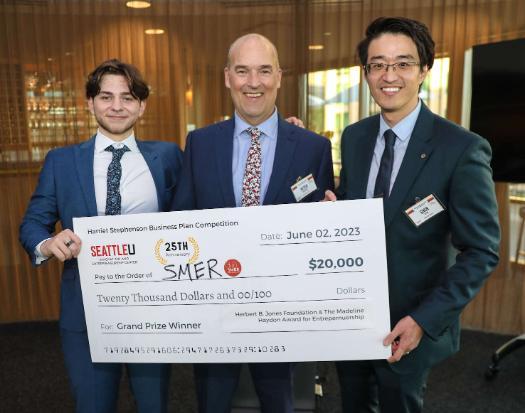
This year’s Harriet Stephenson Business Plan Competition grand prize was won by a team from Seattle University’s College of Science and Engineering (CSE).
SMER is helmed by Shen Ren, PhD, assistant teaching professor at CSE, and Vincent Reitinger, BSME ’25 who is also minoring in Business Administration. The startup is developing a new technology to extend transplant organ viability and biological functions from 24 hours to months. It has established a fully functioning prototype with proof-of-concept results of human cell suspension and animal tissue.
Ren had started work in the cryopreservation field in 2014 as a graduate student at the University of Washington. “Kidney failure is one of the most hopeless diseases as more than half of patients won’t survive until kidney transplantation,” says Ren, who worked with end-stage kidney failure patients in his research. A majority of the grand prize winnings of $20K will be used to support the scale-up and optimization of the prototype.
To date, all of SMER’s seed grants and startup funds were provided by multiple funding agencies including the M.J. Murdock Charitable Trust, Institute of Translational Health Sciences, UW CoMotion, and the Bill and Melinda Gates Foundation. The startup also has a robust, diverse advisory board including world-class scientists, engineers, physicians, experts in business development, and legal counsel.
“Most important of all, we are working with a patient advisory group to ensure that patient inputs are reflected during the research and development process,” added Ren.
A Legacy of Supporting Entrepreneurship
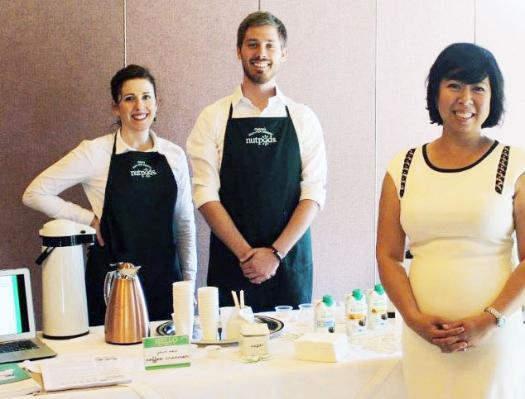
The Harriet Stephenson Business Plan Competition would not be where it is today without the unflagging support from its donors, beginning with the Herbert B. Jones Foundation. The Jones Foundation has been committed to the IEC and the competition since its inception, giving a total of $1.4 million over the years to support the next generation of entrepreneurs.
Other entities who make the HSBPC possible:
- Madeline (pictured above with her team when they won 3rd place in 2015) and Geoff Haydon
- John Meisenbach
- The late Don Leuthold
- Lindsey McGrew
- John Castle family and Ro Health
- Elaine and the late Elgin Baylor
- Kurt Wedgwood
- Jeff Widmyer
- Friends of the IEC
